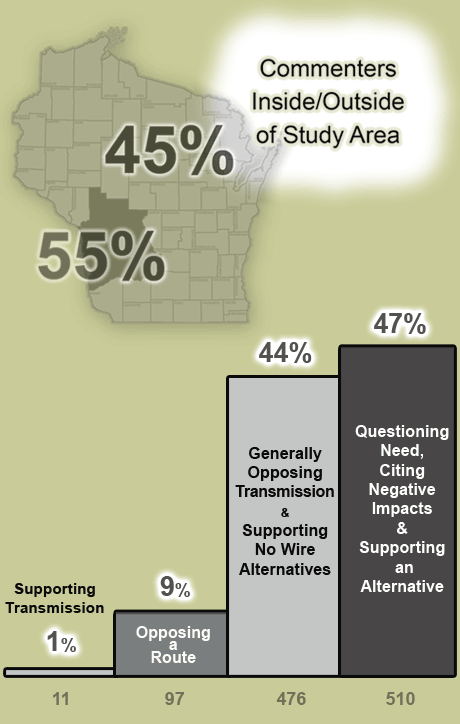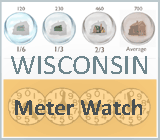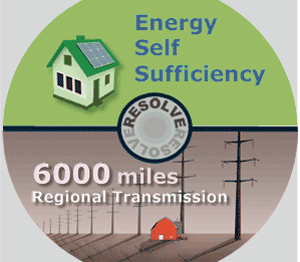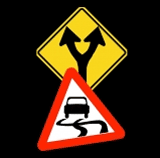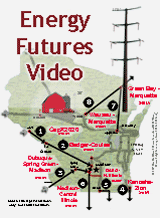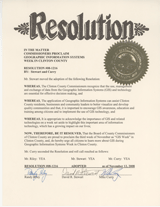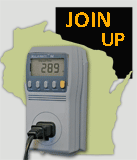See Cardinal-
Hickory Creek (Madison-Dubuque)
345 kV Response
Case Summary Newsletter
Assessment of Final Stages of the Badger Coulee Hearings
a
CETF/SOUL Request to Re-Hear Badger-Coulee
Town of Holland Petition fo Judicial Review of Badger-Coulee
PSC Commissioners Scornful of Ratepayer, Legislator and Expert Input ?
With preliminary approval of the Badger-Coulee transmission line, the Public Service Commissioners voted to spend billions on debt and encouraged transmission expansion as our #1 energy investment for decades to come. The Comissioners ignored a record number of more than 1700 electric customer comments -- 99% opposing the new line with 45% from communities nowhere near the proposed line.
With electric use dropping and solar power on the rise, 12 state legislators, more than 90 municipalities and thousands of Wisconsin residents in 60 counties asked the utilities and the PSC, “What benefits would ratepayers get if the same billions were invested in energy efficiency and local power?” The PSC staff agreed. They asked ATC and XCEL to re-write their entire section on non-transmission alternatives with comparisons for ratepayers to evaluate.
Though the utilities’ rewrite contained no comparisons, the commissioners described it as “complete and thorough.” The commissioners called the alternative comparison made by a nationallly-renowned engineer, “pure conjecture.” The effort of a woman hoping to be told actual impacts on monthly utility bills was labeled, “misleading.” Though need for electricity in Wisconsin is declining, our commissioners praised utilities for excluding declining use from their analysis.
With no environmental goals required for approval, the Commissioners praised Badger-Coulee's hypothetical ability to merely "access" wind power. Here are some important details that failed to make prime time: Access to wind power is not restricted, renewable energy consumption would be unchanged and utility planning assumes carbon emissions will increase over time.
Much of the commissioners' support for Badger-Coulee can be sourced in "at a glance" publicity sheets prepared by the organization that plans "regional" transmission additions, Mid-Continental Independent System Operators. Before MISO planning is handed to states, it is "approved" by an advisory council where private utilities hold about 20 of 26 votes. Transmission planning done for Wisconsin, home of American Transmission Company, a prominent MISO member, includes eight high capacity lines. The parties who pay for expansion lines, ratepayers, are represented by their respective state commissions who possess 1/3 of one vote.
To counter MISO's private motivations and sanctioned prejudice for transmission, MISO's proposals should receive stringent comparisons with competitive energy products like energy efficiency, load management and local power. When Wisconsin's commissioners were handed this opportunity with Badger-Coulee, they dismissed lower cost non-transmission alternatives for the line without risking s single substantive critique.
Wisconsin wasn't always this imbalanced. Before law changes in 1998, PSC consideration required a competitive bid process with energy efficiency, load management and local power. Removal of this competition has lead to unprecedented investment in capital utility products--especially transmission and power plants. The high interest debt for these investments has led to the region's fastest climbing rates and fees.
Many states avoided this path by shifting investments to Energy Efficiency to lower energy use in homes, farms and business rather than build new power plants. Across the U.S., state energy efficiency investments from 2007 to 2012 increased 300% while Wisconsin's fell 25%.
We estimate that transmission expansion would ring up average monthly costs of $3-5 over 40 years. Ratepayers' current investment in efficiency is $1 per month. Though requested by state legislators, municipalities and a record number of ratepayers, Commissioners did not require competitive energy product comparisons for Badger-Coulee when the chips were down.
Unlike the alternatives, Badger-Coulee presents serious financial vulnerabilities. Utility planning shows that any "potential savings" from the investment shrink away as energy use drops. And use is dropping. Under current law, transmission lines are supposed to at least produce savings "reasonably" equal to their financed cost. Once approved, however, there are no protections against overall losses. At least one economic line approved with the same prediction methods used for Badger Coulee is losing money today-- that is-- if the utilities' prediction method is as reliable as they claim. This raises well founded doubt about the economic viability of Badger-Coulee.
During the contested hearings, the utilities refused to predict savings for flat or declining use and criticized engineers representing WI ratepayers for simplifying needlessly complex data and suggesting that "potential savings" for Badger would average around 10 cents per month. The utilities' criticism provided another opportunity for our Commissioners to represent ratepayers and ask ATC and XCEL to supply a better estimate of the impacts on the average utility bill. Instead, the Commissioners took public meeting time to scold ratepayers for asking. Legislators, how can our laws allow this?
This is a time of energy changes. Its time for Wisconsin legislators to inform themselves of the big picture and challenge thin utility rumors. Of particular concern is the rumor that WI ratepayers will be repaid for over investments dating to the late 1990's by WI utilities selling power out of state. Ask: How will WI utilities expand their market as energy use shrinks everywhere? Please explain how these far-fetched pennies would make it back into ratepayers' pockets?
Energy is not about profits from utility sales, its about our state economy. If we do not break this baseless decision-making and creation of unneeded debt, businesses dependent upon power will soon be at great disadvantage in Wisconsin.
When the Commissioners made their announcement about Badger-Coulee, State Representative Steve Doyle summed up ratepayers predicament, “I am proud to have joined with my legislative colleagues to repeatedly ask the PSC for a full needs assessment on this project, which would have opened the door for even more public input in the process. Unfortunately, this request was not met but I hope that it will not discourage the public from continuing to take part in these proceedings."
Consider taking a moment to print out the postcards in the March newsletter. Use them to ask your state legislators to investigate how information so critical to prudent WI energy investment can be ignored.

Selected
Information
8 High Capacity Lines Announced for Wisconsin
Non-Transmission Alternatives Are Profitable for WI Ratepayers
a
How to Access Badger-Coulee PSC Docket
Subscribe to SOUL Email Newsletters
SAVE Money - Join Wisconsin Meter Watch
a
Regional Transmission Expansion
a
SOUL Debate with ATC
JOIN the corps of Wisconsin ratepayers who are finding clever, low-cost ways to reduce their carbon footprint and save money. If your electric bill totals more than 700 kilowatt hours, likely you can make improvements in the 13-30% range. Each participant gets a personalized metrics page to record their progress. Our results will be used to lobby for increases in energy efficiency funding.
Ratepayer Fairness Petition
More than 90 Wisconsin municipalities have formally made this request to the Wisconsin Public Service Commission. Sign the personal online version today and select the "Notify My Friends"option. Paper petitions are also available for DOWNLOAD.
Fork In The Road
2013 Wisconsin Energy Overview
Assessment of where the past decade of energy investments have taken us and our choices that lay ahead.
Data taken from Jan 29, 2013 WI State Senate Energy Committee reports bu utilities and consumer groups. Download [pdf]
SOUL of Wisconsin joined other groups and local governments across Wisconsin in testimony before a Bipartisan Legislative Meeting in Madison concerning Wisconsin's Energy Future. Here' a video of the 16 minute presentaton.
$5 LIFETIME MEMBERSHIPS will be crucial when we intervene in Badger-Coulee. Consider joining with four fellow supporters for a minimum fee of $25. This will raise our ranks and make all five eligible to win a Kill-a-Watt energy use meter. Dona-tions are tax exempt.


